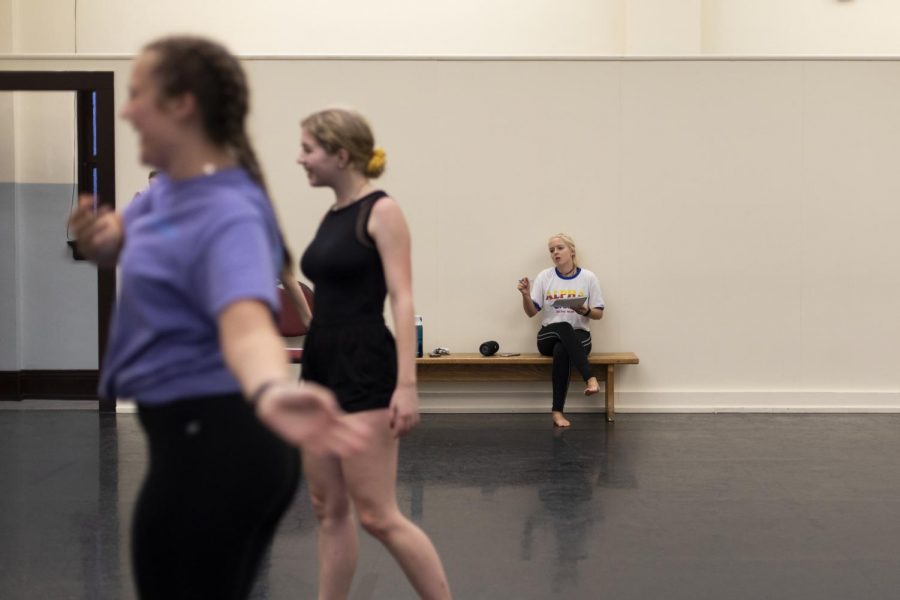Dance ’til you drop: Annual challenge produces choreographed dances in 24 hours
September 10, 2019
Imagine being given just 24 hours to learn something entirely new. Now imagine having to perform this new thing in front of an audience.
Participants of the “Kick the Clock Dance Festival” did exactly that Saturday, Sept. 8, in Gordon Wilson Hall. Starting Friday night, participants were placed in one of six randomly assigned groups and given a choreographer. From there, it was off to create.
Friday night
Each group spread throughout the building and immediately began work on what would be its focus from now until Saturday night. A three-to-four-minute routine to perform in front of an audience was the goal. With no other directions given but the guidance of a pre-chosen song, choreographers began formulating ideas.
Feelings of uncertainty and excitement were tangible as new ideas were tried and failed but followed by words of encouragement. “Kick the Clock” is open to anyone who signs up, which introduced a number of limitations choreographers needed to keep in mind.
“You don’t want to try to make them do something they can’t do,” said choreographer Heather Hartlage, a junior.
You have to be aware of what your dancers are comfortable with, Hartlage added. Not everyone participating was a dance major, and each group had varying numbers of dancers, which further challenged choreographers.
This semester’s “Kick the Clock” drew 40 participants, double the number of participants from last spring, said Louisville senior Elise Wilham, president of the National Dance Education Organization WKU Student Chapter.
“We aren’t judging it, it isn’t a competition,” Wilham said.
She said the goal is to showcase what can be done in 24 hours and to provide a stage and audience. Wilham said she’s looked forward to seeing new faces perform and seeing what they’re capable of.
“Over the last year, our chapter has embraced the hashtag #everyonedances, and this is an opportunity for people to be a part of that without feeling intimidated by more experienced people,” Wilham said.
Saturday morning
Groups arrived as early as 8 a.m. to get back to work on their pieces. While the dancers got some rest the night before, choreographers spent most of the night looking over their group’s progress, listening to their song and thinking of what needed adding before the big performance later that night.
“After I let my dancers go home last night, I spent two hours here by myself listening to the music and thinking of the choreography without wasting their time,” Hartlage said.
Aggravated groans were followed by joyous exclamations as routines’ trickiest sections were overcome. The art was starting to come together, and some groups finished touching up their dance before lunchtime.
Others weren’t as far along. A sense of urgency was easily felt as showtime was just a few short hours away.
However, there was no doubt things would come together. Even groups with completed dances spent the rest of their time smoothing out subtle mistakes and rethinking parts of the piece as necessary.
The big show
At 6:30 p.m. Saturday night, doors opened to the public. Seats were filled almost entirely on all sides by the time the show began.
Each final dance leaned heavily on the music accompanying it, as each group reflected its song’s mood not only through movement but meaning portrayed.
One performance did this especially well, depicting feelings of anxiety and internal struggle. The dance began with four people sitting with their backs to the sides of a table and bound to one of the table’s legs by an elastic band.
Accompanied by the song “Four,” an ambient piece by Icelandic producer Ólafur Arnalds, the dancers moved around the table, exchanged seats and interweaved each other’s elastic bands without tangling them. The piece evoked a feeling of being trapped and ended with three of the four dancers walking from the table while one remained.
Hartlage choreographed a piece she called “Friendzone,” which received backing from John Mayer’s “New Light.” She utilized the song’s upbeat and fun nature to its full potential, focusing on the harsh yet often humorous reality of experiencing unreciprocated romantic sentiments.
“Kick the Clock” is scheduled to re- turn Jan. 31 next semester, with a show set for Feb. 1. More information can be found on the organization’s Instagram and Twitter accounts @WKU_ndeo.
Reporter Andrew Martel can be reached at 270-745-2655 and [email protected].













